Anna Burke theguardian.com, Friday 13 December 20
The new measures to curb misuse of entitlements will do nothing to improve public confidence in politicians. We need a genuinely transparent process – and one exists
Anything to declare? A 747 flies past a 767. Photograph: Tim Wimbourne/Reuters
Let’s start with a confession. Like many members in this Parliament, I have made the mistake of breaching entitlements. In my case, I accidentally exceeded the family travel entitlement and repaid $4,000 to the Department of Finance when they notified me I’d exceed the limit.
In the same year, I had taken the kids with me to Sydney for the select committee on the Australia's clean energy future legislation, and to Lord Howe Island for the joint standing committee National Capital and External Territories. Now I know most people easily remember the number of interstate trips they take in one year but it was a rather turbulent time for me and my family and I forgot. I am not asking for forgiveness: it was my own foolish mistake and one I’m happy – though a little embarrassed – to be upfront about.
My error was brought to my attention by the Department, a different process to the way a number of other members’ incorrect entitlement claims have been uncovered since September. Those issues came to light either by a member of the press gallery, or, more recently, a member of the public examining all members’ published entitlements claims and reporting their concerns. With such potential breaches brought to everyone’s attention, it is up to the Department of Finance to approach an MP for explanation and/or repayment. This process generally occurs while the matter is all over the front pages of the newspapers. The MPs in question then either repay under duress or weather the storm. All the while, public confidence in politicians sinks to new lows.
It should not be the Australian public’s job to police whether MPs are correctly using their entitlements. People have rightly been outraged that the system is not as transparent as it needs to be. A strong democracy demands public confidence in both the politicians they elect to parliament and the system of entitlements they fund. In the aftermath of the most recent entitlements scandal, it’s vital that we assess the effectiveness of the government’s response and whether it actually goes to the extent required to restore public trust and confidence.
Members and senators are paid in arrears for travel claims. In other words, I come to Canberra for the week, I pay my accommodation bill and then send a claim to the department to reimburse. On the form I state the reason for the claim was for the sitting of parliament. Hypothetically, under the current system, I could go to a colleague’s wedding (to pick a not completely random example) and then put in a travel claim stating that the purpose of the travel was for parliamentary business. The Department would accept this claim at face value and no repayment would be sought because for all intent and purposes the claim is not outside entitlement. Most reasonable people though, would contend that such a claim is a rort.
The public should also be aware that any member can seek advice about travel claims from the Department, their party whip or indeed the clerk of the house to ensure they do not breach the rules. Genuine mistakes or other examples of misuse can easily be avoided.
In an attempt to quiet the media storm after weeks of government stonewalling, the special minister of state, Michael Ronaldson, announced measures to curb misuse of entitlements. These include a fine valued at 25% of the claim in breach; naming and shaming in parliament for members who don’t comply with Department requests; and other minor adjustments.
While a fine for rule-breakers sound nice and firm-handed, is it enough to restore confidence? Almost certainly not. Does the government have a ready-made and thoroughly investigated mechanism available to restore public confidence? Yes, absolutely.
In the 43rd parliament I had the opportunity to pursue many roles, one of which was chair of standing committee of privileges and members' interests. During this time, the committee conducted an inquiry into a draft code of conduct for members of parliament. We tabled a draft document for consideration of the parliament and sadly, given the nature of that beast, we had no hope of getting traction on this issue. If we had, many of the ills befalling members and our poor public perception could have been avoided.
This was a thorough piece of research and not just window-dressing like the recent changes proposed by the special minister of state to distract from unwanted but well-deserved media attention.
The inquiry was a product of the agreement reached between the independents and all major parties during negotiations to form government following the 2010 election. It resulted in a discussion paper including a proposed code of conduct against which the public and the parliament could judge all members and senators. The paper also proposed a parliamentary integrity commissioner whose remit would be to receive and investigate complaints.
There had also been movement in the previous parliament to establish a code of conduct not primarily to deal with entitlements, but, sadly resistance ensured that this discussion went nowhere.
The desire to establish a code of conduct had arisen from the issues surrounding the early years of the Howard government where several ministers and parliamentary secretaries lost their roles because of travel rorts. This prompted the Howard government to propose that they would raise the integrity standards. In the end this resulted in the oft quoted Minchin protocols – quietly pay it back and all will be OK.
Meanwhile in the UK there was the more outstanding rorts scandal where six MPs were jailed and literally hundreds were judged to have wrongly claimed expenses.
That episode did little to inspire confidence in politicians as most of the MPs caught out considered themselves more wronged than wrongdoer – victims of a dysfunctional system. Many in the UK scandal claimed they did not know what they were doing was wrong and, given the nature of their very odd system compounded by supressed wages and the temptation to make up the difference of entitlements, they sought forgiveness for these indiscretions.
That is not the case in the Australian system as our entitlements are clear and the system for making a claim is very straightforward. The issue that needs to be resolved is: did any parliamentarians knowingly fill in a form saying they did something they actually didn’t do? Were they not in fact travelling on parliamentary business?
The recent attempts by the Special Minister of State to strength the rules surrounding entitlements does nothing to enhance the system. A simple penalty applies if you get caught and most rorts will still go unchecked.
Senator Ronaldson’s changes do nothing to enhance transparency and will not instil confidence in our system. There is a guide set by the Belcher review and the draft code of conduct sitting on the privileges committee website which should have and could still be embraced. This would do more to answer the question as to why a former member is facing court while others are able to repay – myself included – and add confidence to an already jaded public attitude to pollies with their snouts in the trough.

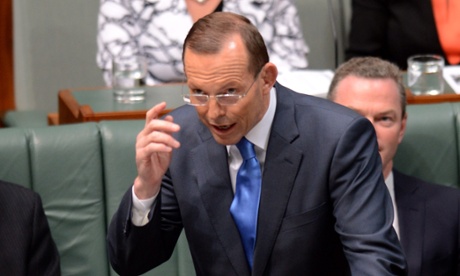 In his downtime Tony Abbott reads Quadrant, Spectator, the Daily Telegraph, the Economist and Policy by the Centre for Independent Studies. Photograph: AAP Image
In his downtime Tony Abbott reads Quadrant, Spectator, the Daily Telegraph, the Economist and Policy by the Centre for Independent Studies. Photograph: AAP Image
 The strategic review effectively cancels the NBN rollout for almost a third of Australia. Photograph: Stefan Postles/AAP Image
The strategic review effectively cancels the NBN rollout for almost a third of Australia. Photograph: Stefan Postles/AAP Image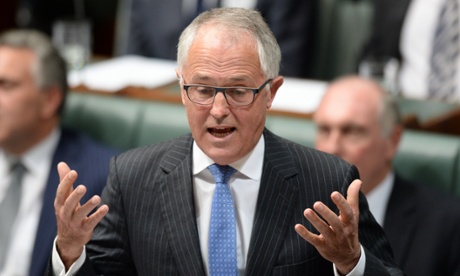 Communications minister Malcolm Turnbull claims the Coalition's NBN election policy was 'written without access to experts'. Photograph: Lukas Coch/AAP Image
Communications minister Malcolm Turnbull claims the Coalition's NBN election policy was 'written without access to experts'. Photograph: Lukas Coch/AAP Image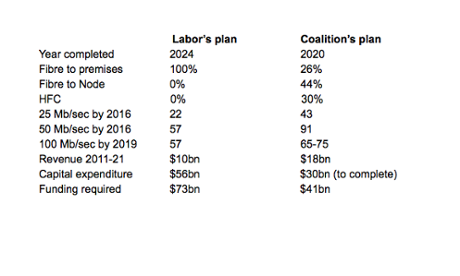





 It’s not too often you see a backflip on a backflip, but education minister Christopher Pyne has managed it. AAP/Stefan Postles
It’s not too often you see a backflip on a backflip, but education minister Christopher Pyne has managed it. AAP/Stefan Postles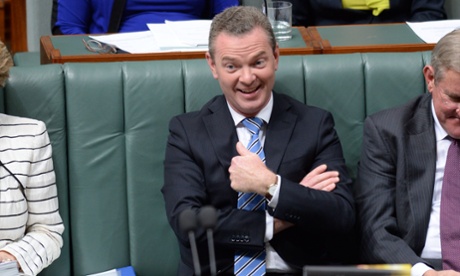 Education minister Christopher Pyne finds himself at the centre of a storm over his Gonski backflip. AAP image for The Guardian/Alan Porritt
Education minister Christopher Pyne finds himself at the centre of a storm over his Gonski backflip. AAP image for The Guardian/Alan Porritt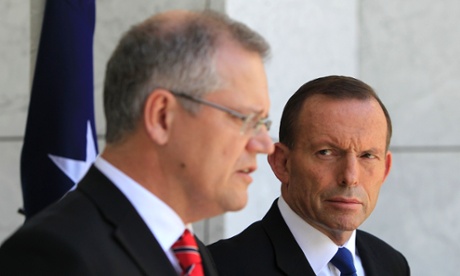 Tony Abbott (right) and Scott Morrison at Parliament House in Canberra on Tuesday. Photograph: Daniel Munoz/AAP
Tony Abbott (right) and Scott Morrison at Parliament House in Canberra on Tuesday. Photograph: Daniel Munoz/AAP


